Industrial Hemp Farming FAQs & Resources
There are an incredible number of varietal options to choose from when considering planting hemp. Knowing who and why you are growing is the first step in choosing an ideal varietal. Is it for CBD, oil, fiber, or hurd? Western States Hemp has experience in planting from seed and clones. We cultivate in different geographical regions of the western U.S. and have extensive knowledge about both feminized row crop grows, as well as large scale seed and fiber industrial grows.

Industrial Hemp FAQs
How many plants do you plant to the acre?
This depends on what type of hemp you intend to farm. If you intend to farm high CBD, row crop varietals, 1500-2000 plants per acre is the average number of plants per acre.
What is the benefit of buying feminized seed or clones? Does it matter if the plant is male or female?
The flowers of the female plant contain the highest amount of cannabinoids (CBD, CBG, CBN), therefore males are highly undesirable when the sole purpose of the grow is cultivating for cannabinoids. If a farm chooses to plant either standard or feminized seed, great care should be taken to cull out any males that present in the field before they pollinate the females. Clones guaranteed by reputable nursery operations are the most reliable way to ensure an entirely female grow.
How is fiber hemp different than high CBD hemp?
Fiber hemp is a single stalk plant that grows between 8-14 feet. High CBD varietals are generally short and bushy, and look like much more like traditional marijuana. Not all fiber varietals contain CBD, and most high CBD varietals aren’t at all desirable for fiber. Most standard fiber varietals available contain on average 1%-3% CBD. The average biomass buyer seeking to purchase raw hemp is looking for a product containing at least 8%, with a preference for 10% or higher. The difference in cost to plant in the beginning tightly correlates to what you can expect to yield when selling the product on the back end. For clarity using round numbers, one can assume that if it costs ten times more to plant a high CBD grow than a fiber grow, one can expect to sell the end product for ten times more than what you can currently expect to yield selling fiber.
Some people in my area are growing high CBD varietals, and I want to grow for seed and fiber. Is there anything I should know?
It is incredibly expensive to plant a high CBD grow, and most expert growers will spend the time and money to consistently monitor their fields to ensure that no males are present. Farming hemp for seed production introduces the very thing high CBD growers are spending time and money to mitigate, which is male pollen. It is estimated that pollen from a male plant can travel up to 5 miles, therefore it is advisable to conduct due diligence regarding the proximity of your nearest feminized grow if you intend to for seed. Most states are working to put in governing methods to ensure that one grow does not impact another if the two are conducting entirely different operations, which will help to minimize potential litigation between growers.
When should I plant my hemp?
Every region is different, so if you are new to farming in general, we highly advise you to consult with a seasoned farmer and agronomist that has knowledge about your soil, water, and weather conditions. Many varietals have been bred to thrive at a particular latitude, therefore a varietal designed for optimum yield at 45 degrees north might not do nearly as well when planted at 35 degrees north. Your local Farm Service Agency may also be able to provide you literature on typical planting windows for crops.
Industrial Farming Consultation
Contact Western States Hemp to find industrial hemp suppliers that can best fulfill your needs, or to have any questions about industrial hemp farming answered.